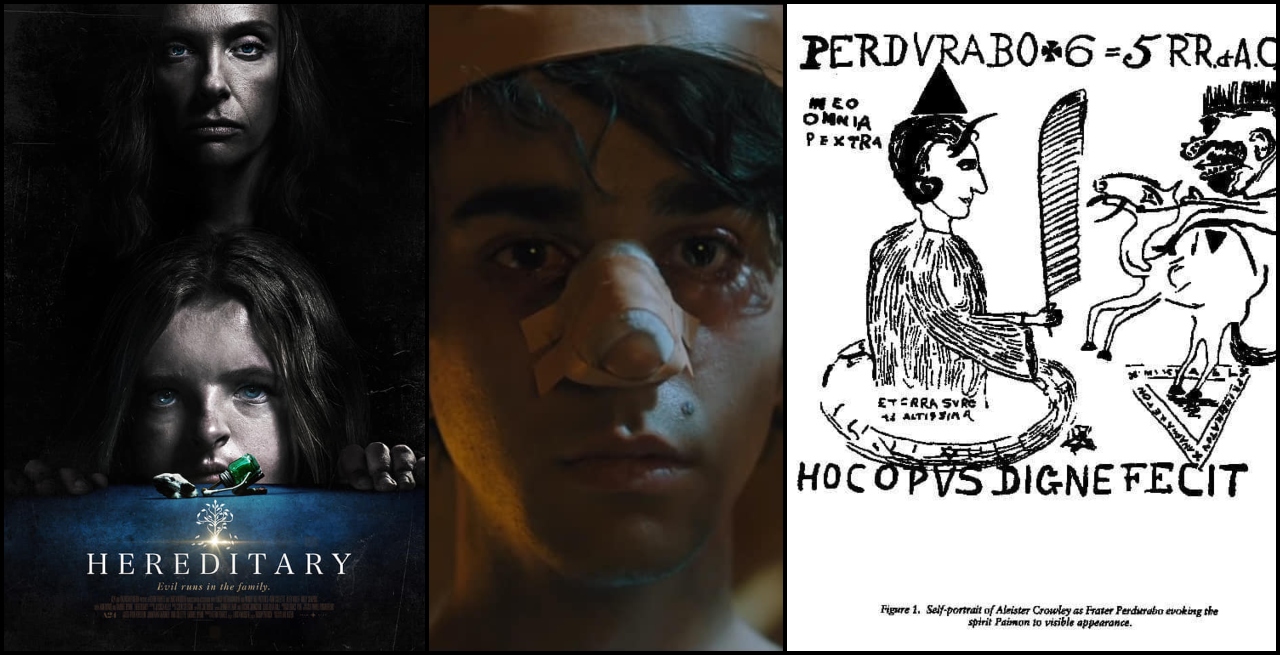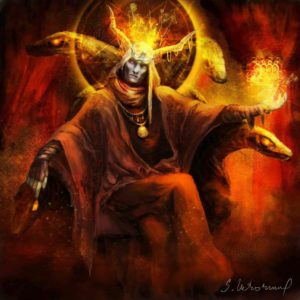
Hereditary shook up the horror community upon its release. The slow-burn torment of being forced to watch a family slowly go mad as tragedies are inflicted upon them, helped to sear the film into viewers’ minds. The ending, with its last-minute reveal of the antagonist, left audiences unsettled, disgusted, and mortified, having been witness to a harrowing blend of body horror, violence, and degradation of the comforting nuclear family unit. But, you might be asking (you do have such an inquisitive mind!), what, exactly, is the bogeyman behind the grim events of the film? Was it actually real? And does it even matter? Well, my curious reader, now is the time to welcome you to this edition of Folklore Friday. My name is Eden, and I’ve summoned you here to talk about the dark figure looming behind the events of everyone’s favorite dysfunctional family film.
[Oh, and there are spoilers ahead, in case you for some reason haven’t seen Hereditary, would be upset at someone telling you how it ends, and yet are still reading this.]

After watching his entire family die in various horrific ways, son Peter finds himself surrounded by cultists who reveal he is now possessed not only by the warped soul of his little sister, but by a demon named Paimon, one of the Princes of Hell. As the cultists chant “Hail Paimon,” Peter stares off into the void, probably also having no clue what’s going on. And honestly, even to those who know their demonology, there’s plenty to be confused about with the portrayal of the so-called “demon.” While Hereditary gets some interesting details right about Paimon, it’s painfully off in other, very predictable ways.
Paimon originated in Mesopotamian mythology as a goddess, and later was turned into a djinni. They are often hermaphroditic, portrayed with both male and female attributes. They preside over the arts and sciences, and thus the purpose of summoning such a being would be for the summoner to gain knowledge in these fields. Hardly the bloodthirsty type, eh? Paimon was famously written about in the grimoire The Lesser Key of Solomon, and later occultist writers would add to their mythos. Other powers ascribed to Paimon are the ability to grant familiars, bestow lordships, reveal the locations of hidden treasures, and one grimoire claims they specifically have the power to control fish. So, summoning Paimon could potentially treat the magician to the greatest all-you-can-eat sushi buffet of their life.

Hereditary does get some interesting points right, though. Paimon’s arrival is said to be presaged by a booming voice that is so loud it cannot be comprehended by human ears. Any summoner must ask Paimon to whisper so that their voice can be understood. The score for Hereditary seemingly takes this into account, as it is full of booming walls of sound. The film also acknowledges Paimon’s hermaphroditic identity, but in an odd way. In the end, both the daughter Charlie and the son Peter are host to Paimon, but throughout the movie, it is insisted that Paimon wants a male host. One has to wonder if the cultists bothered to learn much about Paimon before choosing to worship them. Maybe Peter’s blank stare at the end is actually Paimon wondering at how ill-informed their worshippers are.
Overall, it seems like Ari Aster, the writer/director of Hereditary, only chose Paimon as the Big Bad to avoid the tired trope of having it be the Devil like in so many previous films. Some effort was apparently made at accuracy, but other elements are askew. After all, Paimon was only later demonized by Judeo-Christian-Islamic writers, like so many other Pagan deities. Imagine the Norse God Thor being portrayed in a horror film as a bloodthirsty demon. Unfortunately, while Hereditary’s greatest accomplishment was how it went against the style of most other popular horror films, its greatest downfall is its retention of the ignorant, tropey portrayal of Pagan deities and their followers as monsters. Hopefully Ari Aster educated himself after this. Now, what’s next?
…Midsommar? …Dammit, Ari.
More Reviews
Legend Of The Mountain (1979) Film Review – Triumphant execution of a typical Folktale-ish Narrative
Shih Chun is Ho Yun-Qing, an intelligent student who fails his imperial examination and, after failing to find a respectable job well, decides to become a manuscript copyist. His minimal…
Bleed With Me Film Review – Lets Make A Blood Pact
The breakdown of friendships into the realm of horror has always been a theme fascinating me; the amount of paranoia needed to turn an object of comfort into terror being…
Village of Doom (1983) Film Review
Village of Doom is a 1983 Japanese period crime thriller, written by Bo Nishimura and Takuya Nishioka, and directed by Noboru Tanaka. Primarily working as a Roman Porno director…
Noroi: The Curse (2005) Film Review: Into the Twilight Zone
I want the truth. No matter how terrifying. I want the truth. ~ Masafumi Kobayashi When I think about the genre of mockumentaries, the first image that comes to my…
House (1977) Film Review – Nobuhiko Obayashi’s Horror Comedy With Family Tones
Nobuhiko Obayashi’s House (1977) is memorable as a haunted house movie that defines itself through a whimsical absurdity forming a reality independent from any conventional filmmaking. It presents a cartoonish…
Fear Street Part One: 1994 Film Review – Nostalgia Soaked Horror
Ten years ago in 1994, I was walking into the local bookstore to pick the new…wait….that was 27 years ago? Fine then, I will start over. Almost 3 decades ago,…
Eden is a Soong-type android learning to pass as human through studies of pop culture, humor, and dark fantasy. Perhaps one day she will learn to love and pronounce “hyoo-mahn” correctly. She was written analyses of music, video games, comics, and film. You can find her other writings on Vocal and WordPress.





